Between misunderstanding and admiration, what is the real life of Kung Fu Emperor Jet Li?
In the Chinese film industry, Jet Li is a kung fu legend. He created classic characters like “Once Upon a Time in China,” “Fong Sai-yuk,” and “Huo Yuanjia,” influencing countless audiences.
But in entertainment news and social media, he is often labeled with various labels: changing nationality, calculating, tax evading, fading from the film industry, converting to Buddhism… These labels are viewed by some as shrewd, while others accuse him of being “ungrateful.”
Recently, Jet Li, now over 60, has given rare media interviews. He even proactively addressed the negative news in videos, jokingly addressing the long-standing controversy surrounding him, “renunciation of Chinese nationality.”
This time, he no longer evaded the issue, even employing a self-deprecating tone to turn the heavy public opinion into a laugh.

1. The Truth About Jet Li:
Nationality Controversy, Dowry Controversy, and Views on Life and Death
Jet Li, the “Kung Fu Emperor” now in his sixties, has recently opened up rarely. From the nationality controversy to his daughter’s marriage, to his Buddhist insights on a lighthearted attitude towards life and death, he responded to external questions and curiosity with humor and calmness.
Behind these misunderstood and exaggerated stories lies his life wisdom between rules and choices.
Various theories circulate online regarding Jet Li’s nationality, including rumors that his repeated applications to restore Chinese citizenship were rejected. But he, for his part, has long since lost interest in these jokes.
He jokingly remarked that no matter what he posts online, someone always leaves the comment section with comments like, “A Singaporean actor strikes again.”
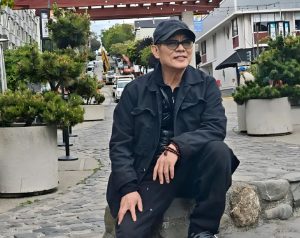
Source: Lianhe Zaobao
This indifference may stem from his long-standing understanding of the rules governing society.
Back in the late 1990s, when Jet Li was making his way in Hollywood, he chose to become an American citizen to facilitate work and travel. The visa-free visa-free access and ease of development in the US passport are practical considerations for an international actor. After his career shifted to Asia, he renounced his US citizenship and became a citizen of Singapore.
The underlying reason is equally realistic: the US implements global taxation, requiring tax payments regardless of where you earn money. Singapore, on the other hand, not only offers favorable tax policies but is also a financial hub with a large Chinese population, a stable society, and low geopolitical risk.
Some criticize him for being “calculating,” even using the term “sophisticated egoism.” But from another perspective, this demonstrates his keen understanding and ability to apply rules.
Jet Li’s background was modest. Born into an ordinary working-class family in Beijing, he lost his father at a young age, leaving his mother to raise five children alone. At the age of eight, he was sent to a martial arts school, not for fun, but for a way to make a living. In the social context of the time, diligence, obedience, and compliance with arrangements were the only means of securing a stable job and a secure life.
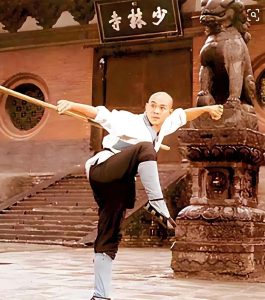
↑Source: Internet
The success of “Shaolin Temple” offered him another path, but it also exposed him for the first time to the unfairness of the rules. A Hong Kong film company offered him a salary of HK$3 million, while his daily wage on mainland Chinese films was only a few yuan.
In co-productions, Hong Kong actors ate boxed lunches from Beijing restaurants, earning 15,000 yuan a month, while mainland actors continued to earn a few yuan from ordinary lunch boxes. This disparity made him question: “Why? On what basis?”

↑Internet image, please delete if infringing
The movie “Shaolin Temple,” with tickets costing only 10 cents at the time, grossed a staggering 160 million yuan at the box office. If this movie were released today, it would undoubtedly gross over a million yuan.
Years later, he summarized his life’s lessons: the relationship between fame, interests, power, and rules. Children from ordinary families often only vaguely understand this by middle age, but he saw it clearly in his twenties. Consequently, he had the ability and resources to choose rules that best suited him.
This also explains why “regaining Chinese nationality” was not a difficult task for him. If he truly wanted to do it, it would be portrayed as a positive example, not a joke of rejection. However, he currently has no such plans.
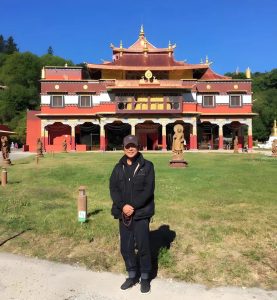
Source: JetLi Instagram, infringement removed

II. “Too stingy” for his eldest daughter?
Jet Li gave his eldest daughter a 300,000 RMB Huawei Smart R7
Besides his nationality, Jet Li has recently been in the spotlight for his 37-year-old eldest daughter, Li Si’s wedding.
As a father, he gave her a new car worth approximately 300,000 RMB as a dowry, the Huawei Hongmeng Smart R7, and humorously wished her on social media: “I hope my daughter gets the car soon so she can take me for a ride anytime.”
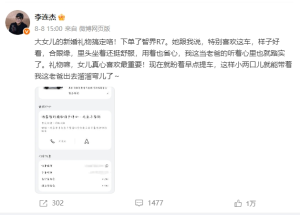
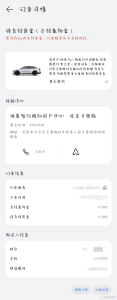
Source: Jet Li’s Weibo, infringement removed
This gift sparked polarized reactions online. Some expressed envy, while others deem it “too stingy.” After all, given Jet Li’s wealth, it wasn’t considered extravagant. However, those familiar with his family know there’s a longer emotional story behind it.
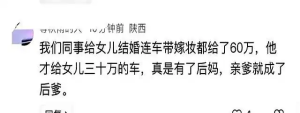
Source: Internet, infringement removed
He married his ex-wife, Huang Qiuyan, in 1987 and has two daughters. Due to their frequent separations, the couple divorced in 1991, and their daughter was awarded custody to Huang Qiuyan. However, due to the pressures of life in the United States at the time, the two children later returned to Beijing, where they were cared for by Jet Li’s mother.
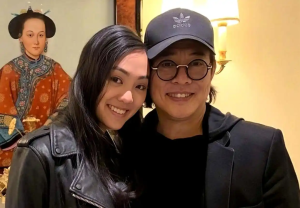
Source: JetLi Instagram, infringing information removed
During his breaks from filming, Jet Li was as involved in his children’s development as possible, enrolling them in private schools, attending parent-teacher conferences, and using his ex-wife to help with communication. After years of hard work, he finally repaired his relationship with his daughters.
So, this car is more of a token of his love and a gesture than a display of wealth. In Jet Li’s view, the bond between father and daughter cannot be measured by money.

Source: JetLi Instagram, infringing information removed

3. Called inhumane for not attending a friend’s funeral?
Jet Li’s high emotional intelligence responds to controversy
Another topic of discussion is Jet Li’s decision not to attend funerals of relatives and friends. Some have called him “inhumane” and “unsociable,” but he sees it as a natural reaction to his Buddhist studies.
In an interview, he explained to the media: Death is an inevitable part of life, and everyone loses loved ones. An obsession with life and death is a sign of being “stuck in the game.”
His attitude stems from a profound family conversation. His youngest daughter, at 19, attempted suicide due to depression. Once she emerged from the trauma, father and daughter were able to openly discuss life, death, and estate planning. In their view, this wasn’t bad luck, but rather a necessary form of honesty.
Jet Li wasn’t indifferent; rather, he chose to express love and care during his lifetime, rather than revisiting regrets at a funeral. He believes people often avoid these topics, but truly having no regrets comes from having done and said everything they should have done in their lifetime.
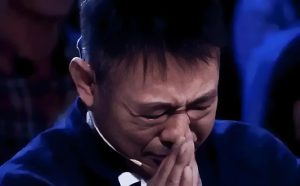
Source: Internet

Fourth: From Misunderstanding to Self-Reconciliation
In “Things About the Ming Dynasty,” Shi Yue commented on Xu Xiake: “There is only one way to success: to live your life on your own terms.” This statement perhaps best captures Jet Li’s character.
Jet Li’s life, from impoverished youth to international superstar, and then to his retirement as a Buddhist monk, is permeated by a single theme: rules. His choice of nationality is an application of rules; the restoration of his father-daughter relationship is an adherence to emotional rules; and his shifting perspective on life and death is an insight into the rules of life.
To the outside world, he may appear shrewd, aloof, and unpredictable; in his own mind, these are all logical, flowing with the flow.
Today, he no longer needs to prove himself through his work, nor does he care about external labels. He can self-deprecate in videos, face misunderstandings with equanimity, express his fatherly love with a modest dowry, and openly explain his reason for “not attending the funeral.”
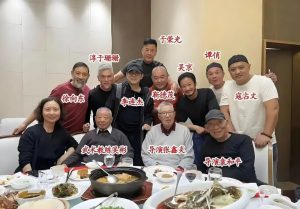
Source: Internet, please delete if infringed.

V. 8 Factors Affecting Singapore PR Applications
To become a Singaporean citizen, you must first obtain Singapore Permanent Resident (PR) status.
Currently, there are two ways to obtain Singapore PR in one step: the Global Investor Program (GIP) and the Overseas Artist Talent Program.
Singapore PR applications are assessed by the Immigration and Checkpoints Authority (ICA) across multiple dimensions, including length of residence in Singapore, family ties with Singaporeans, economic contributions, education, age, family status, social integration, and willingness to settle down. While you can apply after holding an EP for at least six months, the success rate is low. It’s generally recommended to wait two years after holding an EP to accumulate contributions and integration.
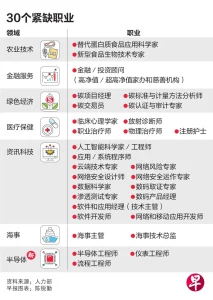
Photo/Source: MOM, Lianhe Zaobao
Eight Key Keys to Improving Your Approval Rate:
① Prime Age: 25-45 years old are the most popular age group, while the challenge increases after 45, with exceptions for exceptional individuals.
② Bonus Points for Advanced Education: No bonus points are awarded for applicants below a bachelor’s degree. Undergraduates may consider pursuing a master’s degree in Singapore.
③ Industry Priority: Six key sectors: Agritech, Finance, Green Economy, Healthcare, IT, and Maritime.
④ Salary Ability: Monthly salary ≥ SGD 6,000 in the financial sector, ≥ SGD 5,600 in other industries. Applicants with a salary ≥ SGD 6,000 can bring their spouse and children with them, and applicants with a salary ≥ SGD 12,000 can apply for long-term residency for their parents.
⑤ Family Application: Applications by the entire family are preferred, and having children significantly increases the score.
⑥ Residence and Integration: It is best to reside in the country for at least two years after obtaining an EP and actively participate in community activities.
⑦ Bilingual Proficiency: Fluency in both Chinese and English is preferred, and proficiency in a local dialect is a plus.
⑧ Public Welfare Contributions: Volunteering, donations, and environmental or educational contributions can enhance your image.
Mnemonic: Young, promising, and highly educated, earning a high salary in the gold industry; living with a family for a long time, bilingualism and charitable contributions are all available!
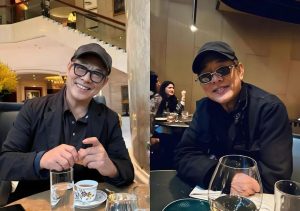
Source: Lianhe Zaobao
Conclusion: Beyond Kung Fu
The title “Kung Fu Emperor” was once Jet Li’s most recognizable calling card. But after turning 60, he seems more like a wandering practitioner, understanding the trade-offs, understanding the rules, and letting go of obsessions.
Some say his life is like a kung fu film: the first half is all-out fighting, the second half is meditation after laying down the sword. Regardless of what others think, he lives his life according to his own script.
Jet Li has found his own balance between being misunderstood and admired. This is perhaps his most enviable “martial arts realm.”
Note: Reference materials are sourced from Singapore’s ICA, MOM, Lianhe Zaobao, and Sanlian Life Weekly, compiled from comprehensive news reports. Reprints must cite the source. Contact us for deletion if there is any infringement.
